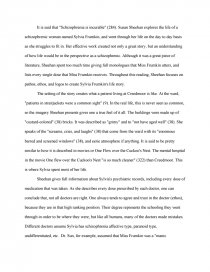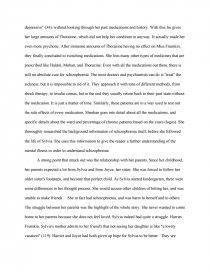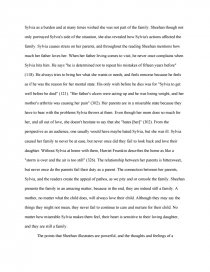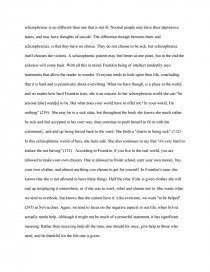Is There No Place on Earth for Me Nonfiction Anaylsis
Essay by Paul • March 22, 2012 • Case Study • 1,642 Words (7 Pages) • 3,428 Views
Essay Preview: Is There No Place on Earth for Me Nonfiction Anaylsis
It is said that "Schizophrenia is incurable" (284). Susan Sheehan explores the life of a schizophrenic woman named Sylvia Frumkin, and went through her life on the day to day basis as she struggles to fit in. Her effective work created not only a great story, but an understanding of how life would be in the perspective as a schizophrenic. Although it was a great piece of literature, Sheehan spent too much time giving full monologues that Miss Frumkin utters, and lists every single dose that Miss Frumkin receives. Throughout this reading, Sheehan focuses on pathos, ethos, and logos to create Sylvia Frumkin's life story.
The setting of the story creates what a patient living at Creedmoor is like. At the ward, "patients in straitjackets were a common sight" (9). In the real life, this is never seen as common, so the imagery Sheehan presents gives one a true feel of it all. The buildings were made up of "custard-colored" (38) bricks. It was described as "grimy" and to "not have aged well" (38). She speaks of the "screams, cries, and laughs" (38) that come from the ward with its "enormous barred and screened windows" (38), and eerie atmosphere if anything. It is said to be pretty similar to how it is described in movies or One Flew over the Cuckoo's Nest. The mental hospital in the movie One flew over the Cuckoo's Nest "is so much cleaner" (322) than Creedmoor. This is where Sylvia spent most of her life.
Sheehan gives full information about Sylvia's psychiatric records, including every dose of medication that was taken. As she describes every dose prescribed by each doctor, one can conclude that, not all doctors are right. One always tends to agree and trust in the doctor (ethos), because they are in that high ranking position. Their degree represents the schooling they went through in order to be where they were, but like all humans, many of the doctors made mistakes. Different doctors assume Sylvia has schizophrenia affective type, paranoid type, undifferentiated, etc. Dr. Sun, for example, assumed that Miss Frumkin was a "manic depressive" (34), without looking through her past medications and history. With this, he gives her large amounts of Thorazine, which did not help her condition in anyway. It actually made her even more psychotic. After immense amounts of Thorazine having no effect on Miss Frumkin, they finally concluded to switching medications. She lists many other types of medicines that are prescribed like Haldol, Moban, and Thorazine. Even with all the medications out there, there is still no absolute cure for schizophrenia. The most doctors and psychiatrists can do is "treat" the sickness, but it is impossible to rid of it. They approach it with tons of different methods, from shock therapy, to insulin comas, but in the end they usually return back to their past state without the medication. It is just a matter of time. Similarly, these patients are in a way used to test out the side effects of every medication. Sheehan goes into detail about all the medications, and specific details about the ward and percentage of chronic patients based on the years (logos). She thoroughly researched the background information of schizophrenia itself, before she followed the life of Sylvia. She uses this information to give the reader a further understanding of the mental illness in order to understand schizophrenia.
A strong point that struck out was the relationship with her parents. Since her childhood, her parents expected a lot from Sylvia and from Joyce, her sister. She was forced to follow her older sister's footsteps, and become that perfect child. As Sylvia started kindergarten, there were some differences in her thought process. She would accuse other children of hitting her, and was unable to make friends. She in fact had schizophrenia, and was harm to herself and to others. The struggle between her parents was the highlight of the whole story. She never wanted to come home to her parents because she does not feel loved. Sylvia indeed had quite a struggle. Harriet Frumkin, Sylvia's mother admits to her friend's that not seeing her daughter is like "a lovely vacation" (119). Harriet and Joyce had both given up hope for Sylvia to be better. They see Sylvia as a burden and at many times wished she was not part of the family. Sheehan though not only portrayed Sylvia's side of the situation, she also revealed how Sylvia's actions affected the family. Sylvia causes stress on her parents, and throughout the reading Sheehan mentions how much her father loves her. When her father Irving comes to visit, he never once complains when Sylvia hits him. He says "he is determined
...
...




